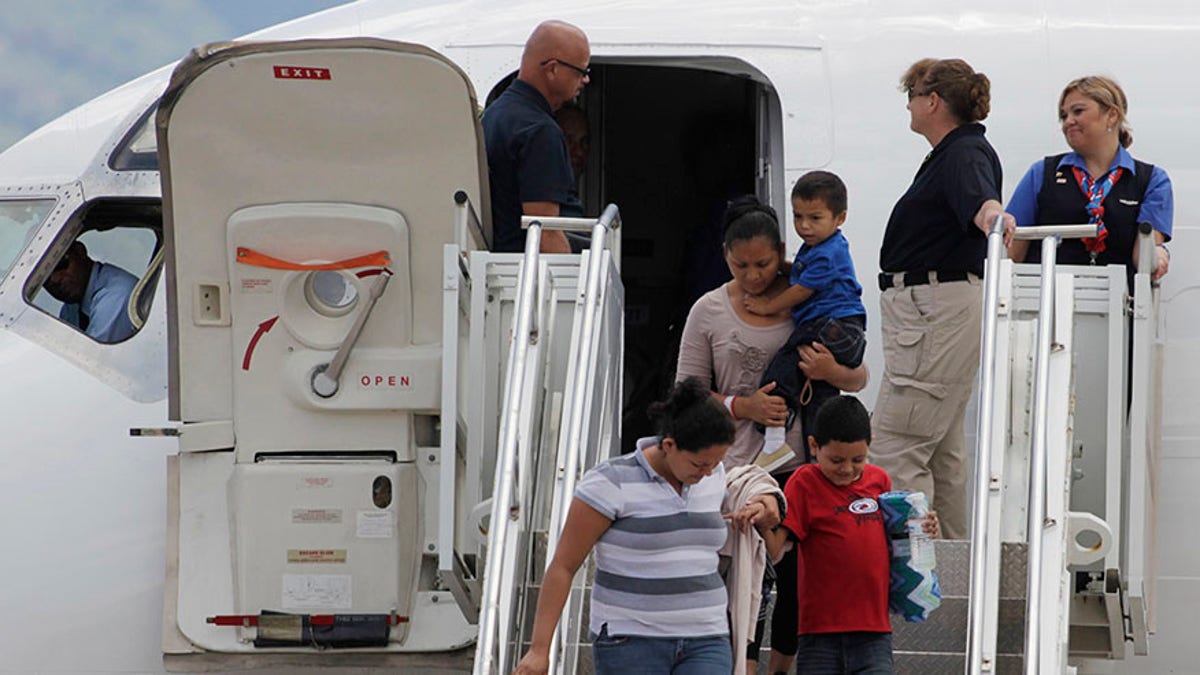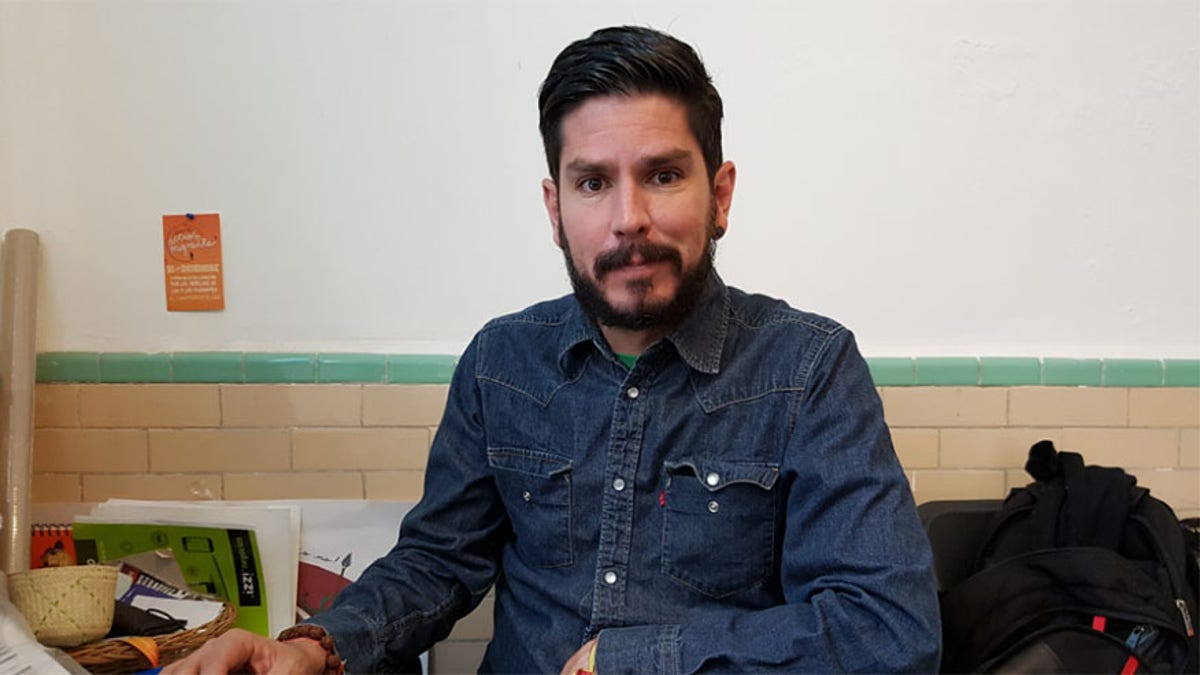
Women hold their children while disembarking from a plane at the Soto Cano military base in Comayagua August 11, 2014. The plane carrying 11 women and 14 children landed at the base after they had been deported from the U.S. While the White House says the number of Central American child migrants crossing the U.S. border has fallen sharply, the big unanswered question remains why. The U.S. government has pointed to the seasonal weather. However, Reuters reporting in southern Mexico and Central America shows it is due to a combination of factors, including tighter border policing, horror tales told by deportees who grappled with drug gangs, an advertising blitz touting the dangers of making the journey and the high-profile arrests of several human smugglers, or coyotes. Picture taken August 11. To match Insight USA-IMMIGRATION/DECLINE REUTERS/Jorge Cabrera (HONDURAS - Tags: SOCIETY IMMIGRATION POLITICS MILITARY TRANSPORT) - RTR422BX (Reuters)
MEXICO CITY – A progressive initiative in Mexico City is giving U.S. deportees the opportunity to obtain English language and teaching qualifications, in an effort to help them rebuild their lives following ejection from their American homes.
An entirely free program, the joint effort between the city’s government and citizens’ council, offers a four to six week teacher training course, culminating in an official TEFL (Teaching English as a Foreign Language) exam, after which successful candidates will be qualified to teach in Mexican schools.

Tomas Perez grew up in Chicago and was deported 12 years ago. He says a teaching program would have been useful - he has lost his English completely. (Alasdair Bavestock/Fox News)
“We have a massive influx of deportees to this country, a pool of talent that is almost entirely ignored by the Mexican authorities,” said Luis Wertman, the president of the Mexico City Citizens’ Council, which brought the idea to fruition. “Yet we have a deficit of over 80,000 qualified English teachers in Mexico, and these people are perfect candidates to fill posts we desperately need.”
ILLEGAL IMMIGRANTS SIGNAL THEY WOULD PREFER DETENTION OVER DEPORTATION
The program’s first course begins on Saturday, and although it has capacity for 100 trainee teachers, so far only 25 spaces on the class have been filled. The Citizens’ Council has been spreading the word of its strategy through advice kiosks at the city’s airport and four major bus terminals, as well as its citizens’ hotline, but has struggled to convince potential candidates of its benefits.
“It seems to be a win-win situation and we are trying to get the word out,” said Wertman, “but unfortunately deportees are not a community who are very trusting of the government.”
Mexico City currently receives three flights of deportees from the United States a week, an average of 350 arrivals, 10 percent of whom choose to remain in the capital. Those who make up this 10 percent are generally young men to whom Mexico is a foreign country, with little cultural or family connections having been taken to the U.S. as young children. Finding themselves alone, without official documentation and spurned by the city’s residents, many end up homeless.
ILLEGAL IMMIGRANT DEFENDED IN PHOENIX PROTESTS IS DEPORTED TO MEXICO
“The deportees live extremely difficult lives,” said Marco Castillo, the founder of IIPSOCULTA, a humanitarian organization that works, among many other projects, to improve the lives of U.S. deportees in Mexico.
“This city is very intense, competitive, angry and expensive. For someone who has been through the psychological stress of deportation from a country they call home, it can be too much.”
Jesus Navarro left his home state of Nayarit with his parents at the age of three, and grew up in California. After being deported two years ago, he said his arrival in Mexico City was a very difficult time.

Marco Castillo is the founder of IIPSOCULTA, a humanitarian organization that works to improve the lives of U.S. deportees in Mexico. (Alasdair Baverstock/Fox News)
“I barely spoke Spanish, and no one here was interested in knowing a chicano (a slang term for Mexican-Americans),” he told Fox News outside the Teletech call center in downtown Mexico City, where he and many other deportees have found work. “I was torn away from my family and friends, it was a very depressing time.”
Tomas Perez, who grew up in Chicago, had a similar experience when he was deported 12 years ago. Now a butcher in a quiet neighborhood of the capital, he said this new program for deportees would have been welcome when he first arrived.
“I had no papers, no one would even give me a job sweeping a floor,” he told Fox News. “It’s good that this initiative will help deportees, but it’s not much good to me. After so long living here I’ve completely lost my English.”
While many deportees find work in call centers where their English fluency can be put to use, the pay is rarely more than the $4.30 daily minimum wage, as employers take advantage of the deportees’ legal limbo status.
Wertman said the English teacher training program aims to show respect to its candidates, and offer them an opportunity at building a sense of self-esteem that is rarely afforded to deportees.
“We refer to them as Returning Mexicans, not deportees, as we want them to think of themselves as belonging to this country,” he told Fox News. “Not only do we aim to train a new generation of English teachers who can benefit Mexican society, but we will offer our participants all the legal help they need to get their Mexican paperwork in order.”
Despite his optimism, the Citizens’ Council president nevertheless feels concerned about the threats of mass deportation by the Trump administration.
“So far we haven’t seen an increase in deportees arriving in Mexico City,” he said, “but we are employing a popular Mexican saying: we are prepared for the worst, but hoping for the best.”
As the news spreads of the government initiative, the Citizens’ Council hopes to include the deportees in the future.
“As a society we feel to a certain extent that we have failed these Returning Mexicans,” he told Fox News. “They left this country to seek a life elsewhere for a reason, and when they return they can feel rejected and without identity or value.
“But solidarity is a Mexican value,” he said with a benevolent smile, “and we have to extend that to all members of our society.”








































